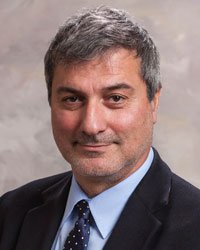
Paolo Macchiarini, the celebrated surgeon whose work has come under scrutiny in Italy and at the Karolinska Institutet in Sweden, committed misconduct in six papers, according to an external reviewer.
Macchiarini is best known for creating tracheas from cadavers and patients’ own stem cells. The findings of the external review, first reported yesterday by SvD Nyheter, were made public last week. They are only available in Swedish thus far, and we have requested a copy from the Karolinska.
External reviewer Bengt Gerdin, of Uppsala University, summarized his findings this way for Retraction WAtch:
The report says the Paolo Machiarini was guilty of scientific misconduct by presentation of fabricated data or other type of information in some cases and omission of relevant data in other cases.
Gerdin told SvD Nyheter (via Google Translate):
All
themisconduct is serious, the big question is whether one should teach young talented people a standard of how to behave, and you will see that it is done this way. It is an extremely bad example for young researchers.
Asked for a response, Macchiarini tells Retraction Watch he can’t comment until he has seen an English translation.
This is one of two reviews commissioned by the Karolinska. The other cleared him of different misconduct allegations brought by Pierre Delaere. An investigation in Italy has also cleared him of most charges.
Update, 10 a.m. Eastern, 5/21/15: Here’s a copy of the report, in Swedish. We’ve also struck through a word in Gerdin’s SvD Nyheter quote after hearing from a Swedish reader that the Google Translate translation was imprecise (as is often the case).
Like Retraction Watch? Consider supporting our growth. You can also follow us on Twitter, like us on Facebook, add us to your RSS reader, and sign up on our homepage for an email every time there’s a new post.
I think this will come down to “omission of relevant data”, meaning post-surgery results. A lot of tissue engineered transplants look great going in and then turn ugly very quickly. You never hear about the numerous surgeries a patient must suffer after “successful” transplantation of a TE construct.
Not that it makes his transgressions any better, but me thinks he is not the only high impact scientist/surgeon that omits negative data from their papers.
We hope that justice will be served as we cannot allow this to go on. It will be a huge shame on the KI if this is allowed or just brushed under the carpet. Action MUST be taken we hope the KI does th right thing! Don’t let the world down KI!
What is astonishing to me is the fact that prof. Gerdin has given interviews to Swedish and american newspapers, and that the Swedish report has been available to the press BEFORE prof Macchiarini had the opportunity to read it in English.
For much more simple affairs -as the review of a paper submitted for publication- the reviewers are asked not to share their opinion with anybody before the final decision of the editorial board.
Prof. Gerdin has done a review of the data; the report has been given to the Karolinska and prof. Macchiarini is supposed to have the opportunity of reply before the final decision. Why is he apparently already considered guilty?
To Chiara Lestuzzi
Prof Gerdin was asked to perform an indipendent evaluation of the discrepancy between the patient charts and the data published in the Lancet, he evaluated the all matter exclusively in relation to the suspicion of misconduct in scientific research. In a case this complicated there cannot be “the guilty” one, rules should have been implemented and followed like for any research project and resulting publication.
Chiara – the Swedish “principle of public access to official records” (offentlighetsprincipen) requires all official documents from public institutions (including universities) to be made official to the press upon publication. This is a basic principle in the Swedish democratic society and a key principle in preventing corruption and has nothing to do with whether people mentioned in the documents have read them or not and not at all astonishing.
Andemariam video 1 year
https://www.dropbox.com/s/u0mimrpcpiq2z1f/Trachea%20implant%20-%20one%20year%20later-1.mp4